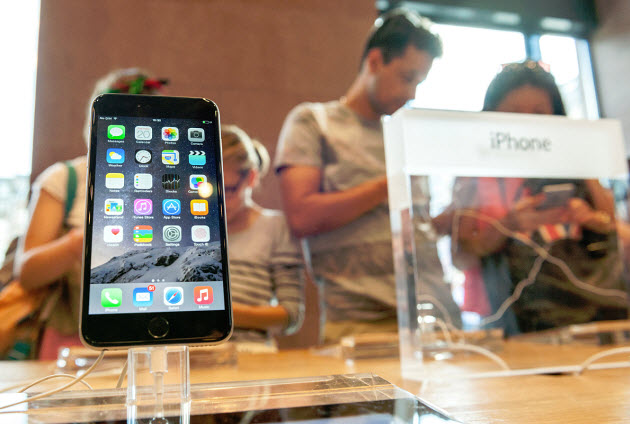The retail stores are starting to change the way that they have made their displays and iPods are losing.
There has been a lot going on over the past few months at Apple, and now there has been another indication that that tech giant is changing its priorities as its displays of mobile devices have been changed around and iPods won’t be included within them, anymore.
This removal of the connected MP3 players is a clear indication of a reduced focus on those gadgets.
Though the iPhones, iPads, Macs, and Apple Watches will still be retaining their places of honor among the mobile devices on Apple Store shelves, employees have now been told that they are to take the iPods down from the displays of those featured devices. Instead, they will be tucked away with other types of gadgets and accessories, such as headphones, battery chargers, and watch bands.
Aside from the change in priority with regards to its mobile devices, the displays at the Apple Stores will be changing.
 Aside from the removal of iPods from the main featured gadget displays, Apple is also going to take the majority of its smart displays away. Those were in the form of iPads that would reveal a product’s details to consumers. Those informational iPad stations will now be taken away and will be replaced with a new information display strategy.
Aside from the removal of iPods from the main featured gadget displays, Apple is also going to take the majority of its smart displays away. Those were in the form of iPads that would reveal a product’s details to consumers. Those informational iPad stations will now be taken away and will be replaced with a new information display strategy.
Instead of relying on the tablets to show the details, the gadgets, themselves, will be introducing customers to what they’re all about. Each of the displayed mobile technology devices will now be displaying its own prices, specifications, and other details on their screens. These changes are effective as of Wednesday.
The fact that the iPod has lost its place among the main featured mobile devices isn’t just an indication that there aren’t as many MP3 players being sold through the Apple Store as there used to be, but it also points to the company’s new focus on the digital side of media. With Apple Music now in the mix, it’s directing its attention away from digital downloads in favor of a business that is more service-based.
This speculation has stated that the addition to the wearable tech could arrive as soon as 2016.
According to a new report that has been released by “Letem světem Applem” one of the next upgrades to the mobile technology available from Apple could be a smart band for its smartwatch.
This change in the Apple Watch accessory could occur instead of updating the actual smartwatch.
By adding the mobile technology of a smart band to the Apple Watch, it has the potential to add a number of features and improvements to the smartwatch. For example, the sensors within the smart band wouldn’t just be able to provide the wearer with added biofeedback. Instead, they could also work to actually recharge the device battery. This could help to overcome one of the primary complaints that consumers have about the device, which is that its battery life is simply not long enough when compared to their expectations for the device.
This would involve the use of the hidden diagnostic port within the mobile technology, and it has already been tested.
 To recharge the wearable tech device, the sensors would use the hidden diagnostic port. That method has already been demonstrated to be effective. The site that has shared this rumor has also indicated that these new bands will also have a number of sensors embedded into it that simply could not be contained within the actual smartwatch.
To recharge the wearable tech device, the sensors would use the hidden diagnostic port. That method has already been demonstrated to be effective. The site that has shared this rumor has also indicated that these new bands will also have a number of sensors embedded into it that simply could not be contained within the actual smartwatch.
Moreover, it also claims that there will be a blood pressure sensor, a respiratory rate sensor, and a body temperature sensor. None of those could effectively be housed inside the smartwatch, but they could be worked into a wrist band to provide wearers with biofeedback that has a certain degree of accuracy. The Apple Watch couldn’t, for example, house the body temperature sensor, as the heat of the device itself would change the results of the reading.
Naturally, there has not been any official confirmation of these rumors that smart band mobile technology would be added to the next Apple Watch. Even if it were absolutely true, the company has a strict policy not to reveal any information with regards to upcoming technology, releases, announcements, or other confirmations or denials of rumors.
 Aside from the removal of iPods from the main featured gadget displays, Apple is also going to take the majority of its smart displays away. Those were in the form of iPads that would reveal a product’s details to consumers. Those informational iPad stations will now be taken away and will be replaced with a new information display strategy.
Aside from the removal of iPods from the main featured gadget displays, Apple is also going to take the majority of its smart displays away. Those were in the form of iPads that would reveal a product’s details to consumers. Those informational iPad stations will now be taken away and will be replaced with a new information display strategy.
 To recharge the wearable tech device, the sensors would use the hidden diagnostic port. That method has already been demonstrated to be effective. The site that has shared this rumor has also indicated that these new bands will also have a number of sensors embedded into it that simply could not be contained within the actual smartwatch.
To recharge the wearable tech device, the sensors would use the hidden diagnostic port. That method has already been demonstrated to be effective. The site that has shared this rumor has also indicated that these new bands will also have a number of sensors embedded into it that simply could not be contained within the actual smartwatch.